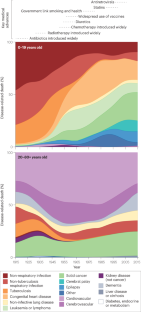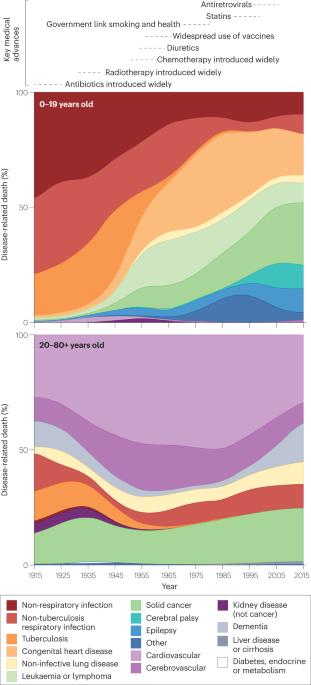癌症会带来他们自己的运气:癌症起源的理论。
IF 72.5
1区 医学
Q1 ONCOLOGY
引用次数: 0
摘要
几十年来,癌症一直是死亡的主要原因。这一令人沮丧的统计数据增加了预防或早期发现疾病的努力,因为治疗侵入性较小,相对便宜,更有可能治愈。但组织的确切转化方式仍在继续引发争议和辩论,阻碍了癌症的预防和早期干预策略。关于癌症起源的各种理论已经出现,包括认为这是“运气不好”:增殖干细胞随机突变的必然结果。在这篇综述中,我们讨论了癌症起源的主要理论以及支撑这些理论的因素的相对重要性。现有证据表明,发育和衰老的组织“走钢丝”,保持足够水平的细胞可塑性来产生和维持组织,同时避免过度转化。与其将癌症视为“厄运”,不如理解细胞内在和外在因素的复杂编排,这些因素是转化的特征,这有望在癌症无法治愈之前发现有效的新方法来预防、检测和阻止它。本文章由计算机程序翻译,如有差异,请以英文原文为准。


Cancers make their own luck: theories of cancer origins
Cancer has been a leading cause of death for decades. This dismal statistic has increased efforts to prevent the disease or to detect it early, when treatment is less invasive, relatively inexpensive and more likely to cure. But precisely how tissues are transformed continues to provoke controversy and debate, hindering cancer prevention and early intervention strategies. Various theories of cancer origins have emerged, including the suggestion that it is ‘bad luck’: the inevitable consequence of random mutations in proliferating stem cells. In this Review, we discuss the principal theories of cancer origins and the relative importance of the factors that underpin them. The body of available evidence suggests that developing and ageing tissues ‘walk a tightrope’, retaining adequate levels of cell plasticity to generate and maintain tissues while avoiding overstepping into transformation. Rather than viewing cancer as ‘bad luck’, understanding the complex choreography of cell intrinsic and extrinsic factors that characterize transformation holds promise to discover effective new ways to prevent, detect and stop cancer before it becomes incurable. Understanding how cell intrinsic and extrinsic factors combine to initiate transformation holds promise for the development of strategies to prevent, detect and treat cancer early. In this Review, Jassim et al. outline the various theories that have currently been proposed for cancer origins, and the determinants of cancer risk upon which they are based.
求助全文
通过发布文献求助,成功后即可免费获取论文全文。
去求助
来源期刊

Nature Reviews Cancer
医学-肿瘤学
CiteScore
111.90
自引率
0.40%
发文量
97
审稿时长
6-12 weeks
期刊介绍:
Nature Reviews Cancer, a part of the Nature Reviews portfolio of journals, aims to be the premier source of reviews and commentaries for the scientific communities it serves. The correct abbreviation for abstracting and indexing purposes is Nat. Rev. Cancer. The international standard serial numbers (ISSN) for Nature Reviews Cancer are 1474-175X (print) and 1474-1768 (online). Unlike other journals, Nature Reviews Cancer does not have an external editorial board. Instead, all editorial decisions are made by a team of full-time professional editors who are PhD-level scientists. The journal publishes Research Highlights, Comments, Reviews, and Perspectives relevant to cancer researchers, ensuring that the articles reach the widest possible audience due to their broad scope.
 求助内容:
求助内容: 应助结果提醒方式:
应助结果提醒方式:


